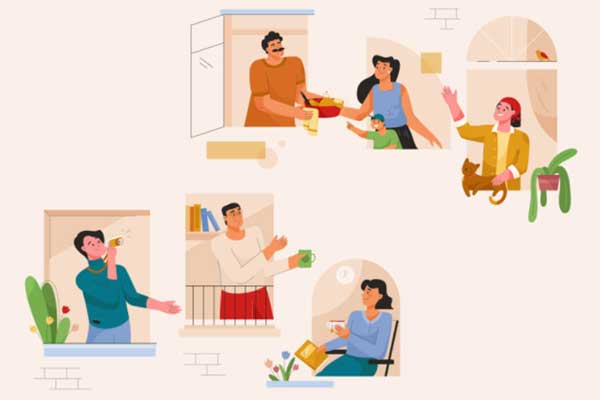As Muslims, we have a unique responsibility towards our neighbors. In fact, our neighbors have rights over us as outlined in the Qur’an, where God says, “Worship Allah and associate nothing with Him, and to parents do good, and to relatives, orphans, the needy, the near neighbor, the neighbor farther away, the companion at your side, the traveler, and those whom your right hands possess. Indeed, Allah does not like those who are arrogant and boastful” (Qur’an, 4:36). The scholar Ibn Kathir states about this verse that the near neighbor may refer to a neighbor who is also a relative and the neighbor farther away is one who is a stranger. Although our busy lifestyles in the West may hinder us from building strong relationships with our neighbors, we should still strive to connect with them as our religion requires.
One of the most recognizable commercial slogans on national television these days is “Like a good neighbor, State Farm is there!” To sell their insurance, State Farm had the genius idea to compare themselves to a good neighbor, and for good reason. The type of neighbor an individual has – good or bad – can make a huge impact on his or her life. Having a reliable, friendly neighbor is reassuring in many ways. If an emergency happens, if you need someone to keep an eye on your children, or even to borrow a cup of sugar, you can knock on that neighbor’s door. They are always there close by, and they can be a person’s lifeline.
So, what does it take to be a good Muslim neighbor? To answer this question, we must look at the life of the greatest neighbor to have ever lived — Prophet Muhammad, peace be upon him! God says in the Qur’an, “Indeed, in the Messenger of Allah you have an excellent example for whoever has hope in Allah and the Last Day and remembers Allah often” (33:21). Our Creator exhorts us to be good neighbors, and He has also provided the guidelines for success in the Sunnah, or traditions, of the Prophet (s).
Below are some of the ways we can become exemplary neighbors to those around us, both Muslim and non-Muslim:
1. Give greetings and a smile
One of the simplest ways we can treat our neighbors with kindness is by smiling at them and greeting them. Prophet Muhammad (s) teaches us that a smile is an act of charity (Tirmidhi). Greeting someone with a friendly, smiling face can brighten their day and make them feel at ease.
When Prophet Muhammad (s) migrated to Madinah, he was welcomed by its inhabitants as a new neighbor. One of the leaders of Madinah, Abdullah Ibn Salam, a Jewish rabbi who converted to Islam, narrated, “When the Prophet arrived for the first time in Madinah, I went with everyone to see him. When I saw him, I knew his face was not that of a liar. The first words he said were, ‘O people, feed the hungry, spread peace, maintain your kin relationships, and pray at night while others are asleep. With this, you shall enter Heaven in peace’” (Bukhari). Would not any person want as a neighbor someone who advocates such high-minded actions?
2. Offer food
Nothing pleases people across cultures more than delicious food. It is no wonder that traditionally, Americans offer a baked treat to new neighbors. In an article on the Huffington Post (sponsored ironically by State Farm), titled “How to Welcome Your Neighbors According to the World,” it is mentioned that the American etiquette experts at the Emily Post Institute stated that the best ways to welcome new neighbors are to deliver a bouquet of garden flowers or a plate of cookies along with a collection of takeout menus from your favorite local places.
Anas ibn Malik reported that the Prophet (s) said, “He does not have faith in me who spends the night satiated while he knows that the neighbor to his side is hungry” (al-Mu’jam al-Kabir). He also advised one of his companions that whenever he cooked a stew, to add water to the broth so as to make enough to give to their neighbors (Muslim). Remember that on those days when you are barbecuing or cooking a spiced meal, the scent of the food reaches the people who live next door and stirs their appetite. They will really appreciate if you send them a plate to enjoy.
3. Visit and check up on them when they are ill
A good neighbor notices if there is something wrong next door – if there is damage to the property, if someone is sick, or if there is some other emergency or need. Checking up on one’s neighbor, without being nosy, and even visiting them or dropping off groceries when they are ill are all actions a Muslim can take to strengthen the relationship. On one occasion, the Prophet’s Jewish neighbor’s son, who used to serve him, fell ill, so he visited him. The youth embraced Islam following this action (Bukhari).
The Prophet, peace be upon him, said, “Anybody who believes in Allah and the Last Day, should serve his neighbor generously” (Bukhari). If there are elderly people living next door, it is benevolent to check up on them often and offer help with placing their trash bins out for collection, mowing their lawn, or clearing their driveway of snow and debris.
4. Give gifts
Prophet Muhammad (s) advised Muslims to give gifts because gift-giving has a positive effect on people and can help build, and when necessary, mend relationships. He said, “Give each other gifts and you will love each other” (Al Adab al Mufrad). Stopping by a neighbor’s house and delivering a gift or leaving something in their mailbox or in front of their doorstep, can leave a lasting impression.
If we do not have the means to buy gifts, or we have too many neighbors to cover, we can offer something simple or focus on one neighbor at a time. One day, Aisha, the wife of the Prophet, peace be upon him, wanted to give a gift to one of her two neighbors, but she was not sure who to give it to, so she asked his advice. He said to give “to the one whose door is nearer to you” (Bukhari). The holidays are a great time to be generous and educate our non-Muslim neighbors. During our Eid celebrations, we can give our neighbors a goodie bag or box of sweets along with a written explanation of what we are celebrating.
5. Do not disturb or harm them
While all the above actions are recommended as part of being a good neighbor, we should also be mindful not to overdo it or disturb them. Because being a good neighbor is emphasized as an act of righteousness, the opposite is true for being a bad neighbor. Prophet Muhammad (s) once said sternly, “By Allah, he does not believe! By Allah, he does not believe! By Allah, he does not believe!” He was asked, “Who is that O Allah’s Messenger?” He responded, “That person whose neighbor does not feel safe from his evil” (Bukhari). For him to have equated disbelief with evil towards one’s neighbor lets us know the seriousness of the matter.
The Prophet also said, “Anybody who believes in Allah and the Last Day should not harm his neighbor…” (Bukhari). This harm includes anything physical, emotional, or even spiritual. Things that can cause physical harm to one’s neighbor are loud parties, offensive smells, damaging their possessions or property, or leaving uncovered trash outside. Emotional harm can be inflicted by being rude, meddlesome, disrespectful, or abusive. As far as spiritual harm is concerned, this can occur when we misrepresent Islam by being a bad neighbor, thus causing them to reject or even hate our religion based on our misdeeds.
We mentioned only some of the Prophet’s many teachings about neighbors. A quick internet search will garner dozens more sayings from Prophet Muhammad about treating neighbors with kindness, because he understood the magnitude of its importance. In one narration, he said, “Gabriel [the angel] continued to recommend to me treating neighbors kindly and politely so much so that I thought he would order me to make them my heirs” (Bukhari).
While they may not have been raised to the level of heirs, our neighbors certainly deserve that we treat them with caring and friendliness. That hopefully uplifts them, demonstrates our faith, strengthens our community, and pleases Allah SWT.





